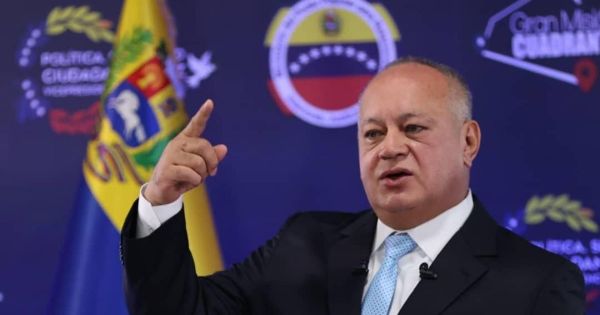Cabello outlines scope of antiterrorist operations
Venezuelan Interior Minister Diosdado Cabello on Tuesday reported on new alleged terrorist plots by the “far right” in collusion with drug traffickers and foreign agents. He asserted that this was a single, coordinated conspiracy, which had been thwarted through arrests across several states, including judges, mayors, and police officers.
“The United States continues to plan plots against Venezuela,” said Cabello, who specifically accused the US Federal Bureau of Investigation (FBI) of involvement, citing a video from a detained drug trafficker, Armando García Miragaya, who allegedly revealed a conspiracy with FBI agents. He displayed a cache of seized weapons, including grenade launchers and machine guns, claiming they were intended for terrorist attacks, not drug trafficking. “Those weapons were not for drug trafficking, but for carrying out terrorist attacks within the country,” he claimed.
He also linked these activities to Colombian drug trafficking and identified former Colombian presidents like Álvaro Uribe and Iván Duque as the political leaders of this alleged scheme. Cabello also emphasized an alleged connection between the opposition leader María Corina Machado and these activities.
Cabello, also Venezuela’s Vice President for Politics, Citizen Security, and Peace, mentioned the capture of Venezuelan citizen Marco José Balbuena Rodríguez, alias Patas Largas, from the state of Zulia, from where he moved to Sucre (northeast).
He also said that four individuals, including two women, were arrested in Los Ruices, Miranda. Among them were Eleomar Vargas (“Zacaría”) and Marlon Meza, who were found with rifles, grenades, and cell phones.
In addition, Colombian national Ender Yesid Gómez Soto was caught transporting radio equipment linked to five remotely detonated explosive devices. Although he claimed he was visiting cousins in Palmira, he was planning attacks on public infrastructure and political figures, Cabello noted. Gómez Soto stated that on June 9, he was paid 700,000 Colombian pesos by someone known as “Abel” to transport explosives hidden in a spare tire to Ureña. The explosives were intended for attacks in Caracas, targeting Fort Tiuna, the National Electoral Council, the Supreme Court, and the Colombian embassy. He also admitted to transporting four individuals in the past year —two Venezuelans, one Colombian, and one foreigner who “did not speak Spanish well”— who were allegedly planning terrorist attacks against Venezuelan political leaders.
In a separate event, Venezuela’s National Assembly (AN) declared Volker Türk, the UN High Commissioner for Human Rights, “persona non grata” and demanded the closure of the OHCHR office in Venezuela, following Türk’s silence regarding human rights violations against Venezuelan migrants, particularly concerning 18 Venezuelan children detained in the United States and 252 Venezuelans allegedly “beaten and tortured” in El Salvador.
AN Speaker Jorge Rodríguez accused Türk of being an accomplice to kidnapping and a hypocrite, calling for the Venezuelan people to protest and demand the return of their children. Other congresspeople echoed these sentiments, accusing Türk of violating human rights conventions by not addressing the situations of Venezuelan migrants and demanding his prosecution.
